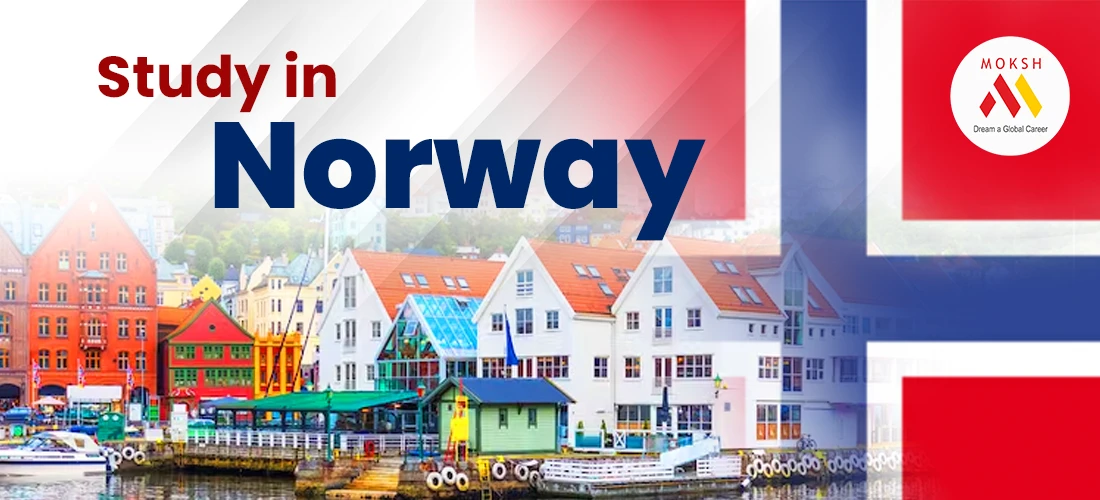
Introduction to studying in Norway
Norway was a popular destination for international students due to its tuition-free public universities, as well as its high quality of life and welcoming culture. With its quality education and variety of English-taught programs, Study in Norway might be a good option for students planning higher education.
Norway boasts renowned universities such as the Norwegian University of Science and Technology and the University of Oslo. These institutions offer a variety of bachelor's and master's degree programs across various fields of study.
Students in Norway also benefit from an outstanding work-life balance, generous vacation time, and flexible study options. Additionally, the country's strong economy and high quality of life make it an ideal place to live and study.
If you are considering studying abroad in Norway, plan your finances early, as the cost of living in Norway can be high.
Quick Facts
| Country: | Norway |
| Capital city: | Oslo |
| Official language: | Norwegian |
| Currency: | Norwegian krone (NOK) 1 NOK~ 7.5 INR |
| Other large cities: | Bergen, Trondheim, Stavanger, and Kristiansand |
| Population: | 5.4 million |
| Universities: | 10 |
Roadmap
Study in Norway: An overview
The education system in Norway is structured on the Bologna Process. It provides a three-tiered approach to higher learning, which includes three-year bachelor's degrees, two-year master's degrees, and extensive doctoral programs that span from three to five years.
When you study in Norway, they speak Norwegian, but a lot of people also speak English. When you go to study in Norway universities, you'll find that many universities have English-language programs, which is great for international students.
For those seeking to study masters in Norway or other levels of degree, they'll find unparalleled education quality, complete with modern facilities, research opportunities and hands-on learning experiences. Indeed, when you opt to study abroad in Norway, you choose an education system.
Norway Education System
In Norway, they use something called the European Credit Transfer and Accumulation System (ECTS). This system makes it easy for students to study in different countries and get credit for their courses and time spent abroad. Typically, one year of full-time university study equals about 60 ECTS credits, which is equivalent to 1,500 to 1,800 hours of learning.
- A bachelor's degree takes three years and earns you 180 ECTS credits.
- Most bachelor's degrees and professional programs like medicine & dentistry are taught in Norwegian.
- A master's degree typically takes two years and provides 120 ECTS credits, building on a bachelor's degree.
- PhD programs usually last three to five years after a master's degree, with candidates being employed and paid a salary.
Is Norway the right place for you?
Norway is a great place for international students to study. It has excellent schools, a strong economy, and a good quality of life. But, before you make a decision, it's important to think about the good and not-so-good things about studying there.
On the one hand, Norwegian universities rank among the best in the world. For example, the University of Oslo is ranked 69th in the QS World University Rankings 2025. Additionally, Norway has a strong economy and a high quality of life.
On the other hand, Norway is one of the most expensive countries in the world. Additionally, Norwegian is the official language of Norway, and it can be not easy to learn. Indeed, students can find it hard to communicate with their classmates, professors, and others in the community. Finally, it can be difficult for international students to find jobs in Norway after they graduate, as Norwegian companies often prefer to hire Norwegian citizens.
The pros and cons of studying in Norway
Pros of studying in Norway:
- High-quality education: Norway has a world-class education system, with universities ranked among the best in the world. For example, the University of Oslo ¸ University of Bergen & Norwegian University of Science and Technology ranked under 500 in the QS World University Rankings 2025.
- Wide Choice of English-taught programs: Universities in Norway offer 200+ English-taught programs at both the undergraduate and graduate levels. Hence, it makes it possible for international students to study in Norway in English without learning Norwegian.
- Safe and welcoming country: Norway is very safe and welcoming for international students. The crime rate is low, and the people are friendly.
Cons of studying in Norway:
- High Cost of Living: The average cost of living for a student in Norway is around 800-1000 USD per month, which is 8-10 Lacs INR for a Year. Likewise, Norway is one of the most expensive Countries in Europe to live in.
- Harsh Winter Climate: Norway has a freezing and snowy winter climate. The average winter temperature in Oslo, the capital of Norway, is around -4 degrees Celsius (24 degrees Fahrenheit), which may be very difficult for many Indians to adapt, AsIndians are used to bright sunny days and may feel depressed without sunlight for a more extended period.
- Language Barrier: Norwegian is the official language of Norway, and it can be challenging to learn. Besides this, only 5% of the Norwegian population speaks English fluently.
- Don’t be ambitious: Norwegians more focus on Work-life balance than being Ambitious. If you put your time from your personal life to achieve your goal in a short time, then it will not be viewed as positive by Norwegian society.
- Low Parental control: Norway believes in a child’s rights first principle. Parent have very little say in all the decision-making of their Kids including the choice of religion they want to adopt etc. It may be very difficult for we Indians who believe in more into family values without any interference from others,
- No Scholarships for International Students: The Norwegian government has withdrawn scholarships for international students to study at Norwegian universities from 2025. If finance is a significant consideration for your higher education, you should explore Free Education in Italy.
Before making a decision, it's important to think about the good and bad sides of studying in Norway. Norway is a wonderful place for students, but you should also think about how much it will cost after your scholarship is gone.
Study in Norway: Top QS Ranking Universities
If you're thinking about studying in Norway, you should check out these universities: the University of Oslo, the University of Bergen and the Norwegian University of Science and Technology (NTNU). They are known for being really good at academics, research, and helping students learn.
In the QS World University Rankings 2025, these are Norway's top universities:
| University Name | QS Ranking |
|---|---|
| University of Oslo | 69 |
| University of Bergen | 127 |
| Norwegian University of Science and Technology (NTNU) | 251 |
| UiT, the Arctic University of Norway | 501-510 |
| BI Norwegian Business School | 551-600 |
| Oslo Metropolitan University | 601-650 |
| The Norwegian School of Economics | 651-700 |
| Norwegian University of Life Sciences (NMBU) | 701-750 |
| Norwegian Academy of Music | 751-800 |
| Norwegian School of Sports Sciences | 801-1000 |
Popular Study Courses in Norway
Norway offers many study programs in English, making it an attractive destination for international students. From bachelor's to doctoral degrees, numerous options are available in various disciplines. Language is not a barrier to accessing quality education in Norway.
Prominent study abroad programs in Norway include:
- Oil & Gas
- Business
- Engineering
- Science
- Tourism
- Fishing

How Much Does it Cost to Study in Norway?
Students from countries in the EU or EEA generally don't have to pay tuition fees at public universities and can study for free. Since 2025, the Norwegian government has stopped free programs in Norway for international students, including Indian students. If you are an Indian student, you must pay tuition fees at Norwegian universities. The study in Norway cost varies significantly depending on which subject you would like to study and your chosen university.
These fees were introduced in 2023 and typically range from 130,000 to 400,000 NOK annually (ca. €11,000 to €35,000). Here is a list of some of the universities and colleges in Norway and information regarding tuition fees at their institutions.
Here is a table of the average tuition fee at top 10 Norwegian universities for international students, as of October 2025:
| No. | University | Tuition fees per year (NOK) | Tuition fees per year (INR) |
|---|---|---|---|
| 1. | University of Oslo | 1.8 to 2.6 Lacs | 12 to 18 Lacs |
| 2. | Norwegian University of Science and Technology (NTNU) | 1.5 to 4.9 Lacs | 17 to 18 Lacs |
| 3. | University of Bergen | 1.9 to 3.8 Lacs | 13 to 27 Lacs |
| 4. | NHH Norwegian School of Economics | 1.8 to 1.9 Lacs | 12 to 13 Lacs |
| 5. | University of Tromsø - The Arctic University of Norway | 1.3 - 3.8 Lacs | 11 to 30 Lacs |
| 6. | Norwegian University of Life Sciences | 1.5 - 4.9 Lacs | 12 to 40 Lacs |
| 7. | University of Stavanger | 1.2 to 1.5 Lacs | 9 to 10 Lacs |
| 8. | Western Norway University of Applied Sciences | 1.6 to 2.6 Lacs | 11 to 18 Lacs |
| 9. | Oslo Metropolitan University | 1.9 to 3.7 Lacs | 13 to 26 Lacs |
| 10. | Nord University | 1.3 to 2.6 Lacs | 9 to 20 Lacs |
Study in Norway for Free: Myth or Reality?
Norway used to be a favoured choice among international students because of its renowned free education system, comparable to Germany and Italy. Specifically, these opportunities made study in Norway for Indian students for free possible without any financial burden.
However, in 2025, the Norwegian government decided to discontinue providing grants to Norwegian universities which had previously covered the tuition fees for international students. Students must explore alternate avenues for funding their education in the universities of Norway. However, a handful of foundations and schemes do offer Study in Norway scholarships to those pursuing degrees or participating in exchange programs, inclusive of PhDs in Norway.
Consequently, the opportunity to study in Norway for free for international students is a major draw. A significant change in the tuition policy at Norway's tuition-free universities has notably influenced the number of global students opting to further their education there. As per recent research, there's been a 50% decrease in international student numbers in Norway.
Concurrently, a growing number of students are exploring the prospects of Free Education in Italy, as it also offers over 500 English Programs in World Ranked Universities. Furthermore, France is seen as an appealing alternative as the educational costs closely match those of Norway and France.
Working While Studying in Norway
Lots of international students work part-time in Norway. It's a good way to learn Norwegian and earn extra money. When you work in Norway, you get a fair wage, extra pay for overtime, a work contract in writing, and a safe work environment.
If you're an international student in Norway, you can work up to 20 hours a week while you have classes, and full-time during breaks. You'll typically make about 10-12 Euros per hour. Knowing Norwegian can help you find a job and earn more. If you have a study permit, you can work part-time without needing additional permits.
How do I Find Work?
In Norway, most job opportunities are posted online. You can check out job listings on the NAV job database, although many of them are in Norwegian. To find jobs in English, just type "English" in the search bar.
Also, many universities have career services, host job fairs, and offer a job portal with parttime jobs for students in Norway. Don't hesitate to ask your school for help in finding a job in Norway.
Interested in an Internship?
Internships present a remarkable avenue for the acquisition of pertinent vocational expertise. Various academic institutions maintain collaborative internship accords with both domestic and international enterprises, particularly in the Norwegian domain.
Typically, participants earn educational credits measured in European Credit Transfer and Accumulation System (ECTS) units, yet monetary compensation may not be forthcoming. A multitude of corporations also extend summertime internship opportunities to scholars engaged in pursuing postgraduate degrees.

Study in Norway Requirements
Are you considering pursuing a full degree in Norway? Securing admission into Norwegian universities can be quite challenging, given their competitive nature. Studying in Norway comes with specific requirements that you must meet. Here are the necessary requirements to study in norway for international students:
- 12th for Bachelor or Graduate for Master's Program
- English language proficiency test scores
- Letter of recommendation
- Personal statement
- Financial proof can come in varied forms (such as bank statements, scholarship letters, letters of support from sponsors, tuition fee waivers, etc.).
In addition to these general requirements, some universities and colleges may have specific requirements for certain programs.
Study in Norway: How to Apply
To study in Norway, you'll need to apply to your chosen university or college. The application process will differ from one place to another, but usually, you'll have to provide these documents:
- Application form
- Transcripts
- English language proficiency test scores
- Letter of recommendation
- Personal statement
If you are considering studying abroad in Norway, it is integral to familiarize yourself with the specific application requirements of each university and program. The Norwegian Ministry of Education and Research is ultimately responsible for higher education in Norway.
Admission Deadline
Generally, the academic year has two semesters, from August to December and January to June. The Norwegian Ministry of Education and Research is ultimately responsible for higher education in Norway.
It is recommended to apply well in advance, at least six months before the start of the semester, to secure your spot and allow sufficient time for visa processing, if applicable.
| Intake | Admission Deadline | Last date to apply |
| Autumn | 1 December 2023 | 1 March 2024 |
| Spring | 1 May 2024 | 1 July 2024 |
Study Permit Requirements in Norway
Visa rules for studying in Norway are important. They're the same for students coming for degrees or short exchanges over three months.
- Study Permit: If you're not from the EU, EEA, or Switzerland (like Indian students), you need a study permit. This is a must.
- Money Matters: You've got to prove you can financially support yourself. It's about 9.60 Lacs INR per year.
- Work Option: Students from anywhere can work part-time (20 hours a week) during studies and full-time on holidays.
Indian students can get their visa through the Norwegian Embassy or Consulate in India. Other international students can apply online through the Norwegian Directorate of Immigration (UDI).
MOKSH: A reliable consultant to Study in Norway
Norwegian universities require international students to have strong academic credentials for admission. Moreover, admissions at Norwegian universities can be complex and time-consuming. MOKSH Overseas Education counselors can help you navigate these processes and increase your chances of success.
Conclusion: Norway's educational edge
Norway's education offers a unique opportunity to experience quality education. Besides the shortcomings, the advantages of studying, particularly in Norway, are plentiful. By considering Norway as your study destination, you can embark on a journey that combines education, cultural exploration, and personal development.




